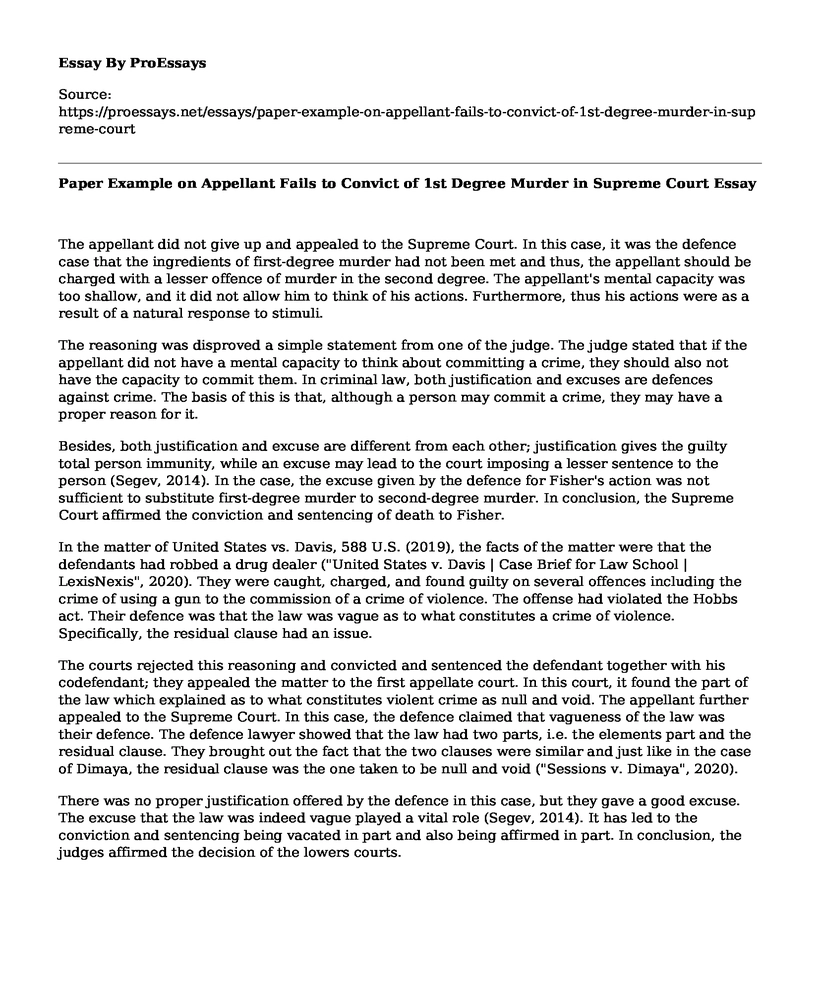The appellant did not give up and appealed to the Supreme Court. In this case, it was the defence case that the ingredients of first-degree murder had not been met and thus, the appellant should be charged with a lesser offence of murder in the second degree. The appellant's mental capacity was too shallow, and it did not allow him to think of his actions. Furthermore, thus his actions were as a result of a natural response to stimuli.
The reasoning was disproved a simple statement from one of the judge. The judge stated that if the appellant did not have a mental capacity to think about committing a crime, they should also not have the capacity to commit them. In criminal law, both justification and excuses are defences against crime. The basis of this is that, although a person may commit a crime, they may have a proper reason for it.
Besides, both justification and excuse are different from each other; justification gives the guilty total person immunity, while an excuse may lead to the court imposing a lesser sentence to the person (Segev, 2014). In the case, the excuse given by the defence for Fisher's action was not sufficient to substitute first-degree murder to second-degree murder. In conclusion, the Supreme Court affirmed the conviction and sentencing of death to Fisher.
In the matter of United States vs. Davis, 588 U.S. (2019), the facts of the matter were that the defendants had robbed a drug dealer ("United States v. Davis | Case Brief for Law School | LexisNexis", 2020). They were caught, charged, and found guilty on several offences including the crime of using a gun to the commission of a crime of violence. The offense had violated the Hobbs act. Their defence was that the law was vague as to what constitutes a crime of violence. Specifically, the residual clause had an issue.
The courts rejected this reasoning and convicted and sentenced the defendant together with his codefendant; they appealed the matter to the first appellate court. In this court, it found the part of the law which explained as to what constitutes violent crime as null and void. The appellant further appealed to the Supreme Court. In this case, the defence claimed that vagueness of the law was their defence. The defence lawyer showed that the law had two parts, i.e. the elements part and the residual clause. They brought out the fact that the two clauses were similar and just like in the case of Dimaya, the residual clause was the one taken to be null and void ("Sessions v. Dimaya", 2020).
There was no proper justification offered by the defence in this case, but they gave a good excuse. The excuse that the law was indeed vague played a vital role (Segev, 2014). It has led to the conviction and sentencing being vacated in part and also being affirmed in part. In conclusion, the judges affirmed the decision of the lowers courts.
References
Fisher v. United States | Case Brief for Law School | LexisNexis. Community. (2020). Retrieved 5 April 2020, from https://www.lexisnexis.com/community/casebrief/p/casebrief-fisher-v-united-states.
Segev, R. (2014). Responsibility and Justificatory Defenses. Criminal Law And Philosophy, 11(1), 97-110. https://doi.org/10.1007/s11572-014-9361-y
Sessions v. Dimaya. Community. (2020). Retrieved 5 April 2020, from https://www.lexisnexis.com/community/case-opinion/b/case/posts/sessions-v-dimaya.
United States v. Davis | Case Brief for Law School | LexisNexis. Community. (2020). Retrieved 5 April 2020, from https://www.lexisnexis.com/community/casebrief/p/casebrief-united-states-v-davis-742947032.
Cite this page
Paper Example on Appellant Fails to Convict of 1st Degree Murder in Supreme Court. (2023, May 08). Retrieved from https://proessays.net/essays/paper-example-on-appellant-fails-to-convict-of-1st-degree-murder-in-supreme-court
If you are the original author of this essay and no longer wish to have it published on the ProEssays website, please click below to request its removal:
- Human Rights and Forced Migrations
- Persuasive Essay: Stealing Music Is a Crime That Should be Punished Severely
- Criminal Justice Reform: A Case Study of Cambodian Implementation of Legal and Judicial Reform
- Essay on Digital Evidence in Courts: Authentication and Relevancy
- Essay Example on Crime: A Social Scourge That Needs to Be Addressed
- Truth & Reconciliation Commissions: Examining Past Human Rights Abuses & Historical Injustices - Essay Sample
- Essay Sample on secure Computer Forensics: Investigator & Crime Lab QA/QC







